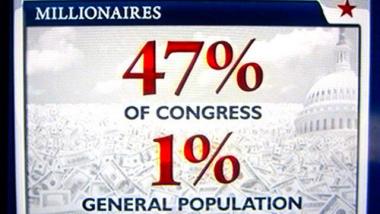
Do you wonder which members of Congress routinely side with the richest 1 percent and Wall Street? Which lawmakers consistently vote to cut taxes for the rich, protect off-shore tax havens for transnational tax dodgers, and ensure that wealth is taxed more favorably than income from work? Who tirelessly side with global corporations at the expense of domestic small businesses?
On the other hand, are you curious which members of Congress are committed to an economy that works for everyone, not just the 1 percent? What lawmakers back a level playing field between small business and transnational corporate conglomerates? Who are the voting champions for people who work for wages, dream of health insurance, and aspire to education their children without decades of debt?
In the new “Congressional Report Card for the 99 Percent" (full disclosure—I'm a co-author), the Institute for Policy Studies examined 40 different legislation actions in the House and Senate—votes and legislation introduced—to ascertain the real allegiances of sitting members of Congress. These include votes to extend the Bush tax cuts for the wealthy, levy a Wall Street speculation tax, invest in infrastructure, and protect workers and student financial aid.
The most promiscuous protectors of the rich were Republicans. But, 17 Democrats also got low marks.
Not surprisingly, the most promiscuous protectors of the privileged were Republicans. But 17 lawmakers in the Democratic party also got low marks. For example, in the U.S. Senate, Montana Senator Jon Tester and Virginia Senator Jim Webb—sometimes considered progressive—showed up on the list of “1 Percent Friendly Democrats.”
Senators Mark Pryor (D-AR), Joseph Leiberman (I-CT), Kay Hagan (D-NC) and Ben Nelson (D-NE) also shared the “1 Percent friendly” distinction.
The Report Card also graded politicians for their commitment to reducing inequality and boosting the 99 percent. The report’s “Honor Roll” gives an A-plus grade to 5 members of the U.S. Senate and 14 House members, including Senators Sherrod Brown (D-OH), Dick Durbin (D-IL), Al Franken (D-MN), Bernard Sanders (VT-I), and Sheldon Whitehouse (D-RI).
Nine Republican members of the House of Representatives got passing grades in the effort to reduce inequality. These included Rep. Tim Johnson (R-IL), Walter Jones (R-NC), and Justin Amash (R-MI).
The personal wealth of a politician did not dictate whether they were allied with the 1 percent or the 99 percent. Of the 20 wealthiest members of Congress, including the ten richest Republicans and Democrats, 13 of them got passing grades in reducing inequality and only 1 got an “F” grade.
The failing grade went to Congressman Rodney Frelinghuysen of New Jersey whose $22 million fortune makes him one of the 16 richest members of Congress. He ranks as the top “rule rigger” on behalf of the 1 percent, casting votes that only boost his own wealth and power.
The politics of deflection has worked for decades to divide and distract voters. If pro-1 percent, pro-Wall Street candidates can get their constituents to blame the poor, immigrants, people of color, and gays and lesbians for their economic challenges, then we will likely get policies that favor the 1 percent at the expense of the 99 percent. But if voters put on their “99 to 1” special glasses, then we can look forward to a political realignment in the coming years.
Chuck Collins is a senior scholar at the Institute for Policy Studies where he directs the Program on Inequality and the Common Good.
This article originally appeared on Yes! Magazine.
Share +
- Share The Congress Members That Routinely Side with Wall Street and the 1% on Facebook
- Tweet The Congress Members That Routinely Side with Wall Street and the 1%!
- Share The Congress Members That Routinely Side with Wall Street and the 1% on Google +
- Reddit The Congress Members That Routinely Side with Wall Street and the 1%!

